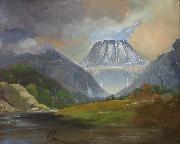
Öl auf dem Segeltuch,das echte Aroma von alten Meistern
1
|
|
|||
|
Peder Balke
|
|||
| Peter Andersen was born on the island of Helgøya, in Hedmark county, Norway. He grew up Ringsaker, but stayed in the 1820s on the Balke farm in Toten in Oppland county. Farmers in Toten paid his education, and as thanks he decorated several of the farms in Toten on his return. They actively encouraged his painting activities and later supported him in higher education. In the autumn of 1827, Balke served as an apprentice to Heinrich August Grosch. he was also a student at the Tegneskole under Grosch and Jacob Munch. Balke signed a two year contract as an apprentice at the Danish decoration and artist Jens Funch. From autumn 1829 to spring 1833, he was a pupil of Carl Johan Fahlcrantz at the art academy in Stockholm. Balke was also a pupil of Johan Christian Dahl from 1843 to 1844. During the summer of 1830 he walked through Telemark, Rjukan, Vestfjorddalen over Røldal and Kinsarvik to Bergen, and then back over Vossevangen to Gudvangen, further over Fillefjell to Valdres and thence across the mountains to Hallingdal. All the way he painted and drew small sketches that were later developed into paintings. He also traveled to Germany, and Russia. He visited Paris and London. In Stockholm, he completed several of the paintings he had outlined of his Finnmark tour. Some of these were sold to the royal family. In 1846 he sold thirty of his paintings to Louis-Philippe of France for Versailles. Besides the 17 paintings in the National Gallery in Oslo, Peder Balke also is represented at several major art collections in Norway and Sweden. | |||
|
|
|||

| |||
|
|
|||
|
|
|||
1 | Vorheriger Künstler Nächster Künstler | ||





